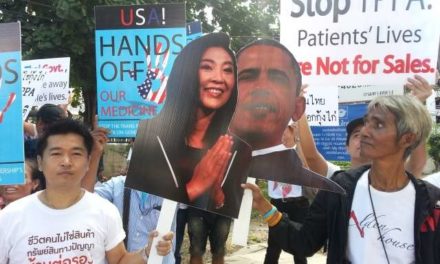WTO Deal:
Manmohan Singh Government Must Obtain Explicit Mandate of the Parliament for the Mini Ministerial
– Statement from the Indian Peoples Campaign against the WTO (IPCAWTO) on upcoming WTO Mini-Ministerial Conference (21-25 July 2008) at Geneva
After several failed attempts over the last 7 years, the WTO will yet again try to conclude the Doha Round of trade talks at a Mini-Ministerial meeting in Geneva from 21-25 July 2008. WTO Director General Pascal Lamy has announced that a select group of Ministers (including Indian Commerce and Industry Minister Kamal Nath) will be invited to this meeting to finalise critical aspects of ongoing negotiations. Two revised texts, on agriculture and non-agricultural market access (NAMA) issued on 19th May 2008 will form the basis of negotiations.
The IPCAWTO is of the firm opinion that the latest texts confirm that the current developments in the WTO are tilting the outcome decisively against the interest of farmers, agricultural labour, fisherpeople,working classes, small enterprises and consumers. The signatories to this statement believe that the Government of India should not agree to a deal at the Geneva meeting for the following reasons.
Fundamental Imbalance in Agriculture
The current text requires India (and other developing countries) to reduce tariffs on agricultural products by 36 percent as against the developed countries obligation to reduce them by 54 percent. It must be noted that an average cut of 36 percent on bound tariffs in agriculture is a stiff proposition for India. The market access implied in the visualised reduction in developed countries tariffs will depend on what happens in the top bracket tariffs which are very high and precisely where no hard commitment is visible. Moreover, the issue of elimination/substantial reduction in subsidies by developed countries, particularly USA, still remains hanging awaiting a ‘political solution’. Even assuming that the largest reduction indicated in the likely range materialses, the level of permissible subsidies in USA will still remain much higher than the actual level prevailing in 2007. And the huge lot of the so-called “Green Box” subsidies will continue to remain outside any effective multilateral discipline, leave aside any reduction commitment whatsoever. It is unrealistic to expect any substantial improvement in the situation from the developing countries’ point of view at the forthcoming Ministerial Conference, given that the Bush administration does not have the “fast-track” authority from the USA’s Congress to sign a Doha Round agreement. The recent passage of the Farms Act (which patently runs counter not only to the expectations of developing countries but also the public stand of the Bush Administration in the negotiations in the current round) by both the houses of the USA legislature by a veto- proof majority is a clear enough portent.
Minister Kamal Nath has a mandate to safeguard the livelihoods of millions of small and marginal peasants. He has argued that the Special Products and Special Safeguard Mechanism will enable him to do this. The current text permits only 8 percent of tariff lines as eligible to be treated as Special Products and of these, only 40 percent, i.e. only 3.2 percent of the tariff lines, will be subject to no tariff cuts and remaining 60 percent i.e. 4.8 percent of tariff lines will be subject to an average of 15 percent cuts. India has 715 tariff lines in agriculture. Considering the multiplicity of our agricultural product range and the crucial importance of these products for livelihood, the range of protection available is too narrow and too weak.
As regards the Special Safeguard Mechanism, the criteria in the text for price-based measures are too restrictive and ineffectual. Thus, the provision to impose additional duty to protect the peasantry from sharp declines in international prices and consequent surge or threat of surge of imports can be invoked only if the import price declines to or below the designated ‘trigger price’ which the text suggests to be 70 percent of the average import price of the preceding three years. And the additional duty to be levied can not exceed 50 percent of the difference between the actual import price and the trigger price. By definition, the import price will continue to remain much below the ‘trigger price’ even after the levy of additional duties. Moreover, this measure will be applicable only on a shipment-by-shipment basis. The protection offered is therefore ineffectual.
It is well known that the adverse impact of a decline in international prices in a domestic market integrated with the world market is felt even before or without large scale actual imports. What is needed to insulate the peasantry from such adverse impacts is a strong signal like immediate imposition of quantitative restrictions. Indian government has willfully missed the bus in not insisting on the right to impose quantitative restrictions to safeguard the interest of Indian peasantry. All in all the protection regime visualised in the text is too limited and ineffectual to protect the livelihood of millions of small and marginal farmers against the surge or threat of surge of cheap imports of products which would continue to be heavily subsidised.
NAMA: Opening the Door for De-industrialisation
IPCAWTO believes that in the NAMA text, the tilt against the developing countries is even more blatant. The universal binding of tariffs, the line-by-line tariff cutting instead of average reduction targets, application of the ‘Swiss Formula’ and more than proportionate reduction in the tariffs of developing countries through low coefficients and few exceptions, which constituted the hallmark of the earlier text continue to govern the approach in the latest text. What is worse, the ‘Paragraph 8 flexibilities’ which were insisted upon by developing countries to mitigate the harshness of the approach have been effectively diluted, if not nullified, by the latest text.
The choice of low coefficients leaves developing countries with little margin or maneuverability. Recent analysis has shown that developing countries which have had historically high tariffs would need very high coefficients to avoid or smoothen the adverse impact on their industries. But the ranges prescribed now are effectively the same as before i.e. 7-9 for developed countries and 19-26 for developing countries. India’s current level of applied tariff is, on average, 10 percent, and the bound level average is 34 percent. The cut which the formula would likely entail will require drastic reduction of bound level of tariff. With few exceptions available under the dispensation of the text, it leaves the door to de-industrialisation wide open.
Concerns on Services and Implementation Issues
On the crucial issue of the General Agreement on Trade in Services (GATS), there is an attempt by USA and Australia for a so called ‘Signaling Conference’ to push for newer market access commitments, particularly in financial services. Financial integration with the global markets has a sinister implication in the present context. The ‘toxic waste’ of the financial services market in USA which virtually brought the recession in US economy needs to be dumped somewhere. And what, in the eyes of the developed world, could be a better place for the purpose than the burgeoning financial services sector in India? India already has a powerful ‘in-house’ lobby advocating liberalisation and further opening of banking, insurance and other financial services sectors. USA would, therefore, knowingly enhance their pressure in this regard.
When the Doha Round was launched it was agreed that a satisfactory conclusion of all outstanding implementation issues would be an integral part of its mandate. Among these was the importance of introducing into the Agreement on TRIPS, a mandatory requirement for the disclosure of the origin of biological resources and/ or associated traditional knowledge used in inventions for which property rights are applied for. In pursuance to this developing countries proposed a text of a new Article 29 bis in the Agreement on TRIPS. Leave aside a thoroughgoing review of TRIPs which developing countries had asked for, this is the minimal corrective step that the Doha Round should have achieved in the direction of mitigating the wrongs perpetrated by TRIPs. Two years down the line, there has been no progress whatsoever. Like several other implementation issues that have fallen through because of intransigence of developed countries, we fear that this too will be ignored at the Geneva meeting.
Lack of Mandate
India has little to ‘take’ in the national interest and a lot to ‘give’ in the new texts. It is also important to recognise that the Bush administration does not have the authority from the USA Congress to conclude the negotiations in a credible manner. The “fast-track” authority which gives credibility to the offers made by USTR in the course of negotiations lapsed in July 2007 and is unlikely to be renewed in the near future. The recent passage of the Farms Act (which is inimical to the interests of developing countries, runs counter to the spirit of the ongoing negotiations on agriculture and which is even against the public stance of the Bush administration in these negotiations) by both the houses of the USA legislature with a veto-proof majority is a bad enough portent casting a deep shadow on the credibility of US negotiators and indicating that no deal with the USA at this stage can have any finality or reliability.
The Manmohan Singh Government must not take decisions at the upcoming Mini-Ministerial meeting without explicit approval from the Indian Parliament.
The IPCAWTO’s demands are unambiguous. India must not yield the ground either in Agriculture or in NAMA. India should expose the lack of authority and, therefore, credibility of USTR in the negotiations at this stage. And Minister Kamal Nath should refrain from proceeding further until he gets explicit approval of the Indian Parliament on the stand he proposes to take at the forthcoming ministerial.








